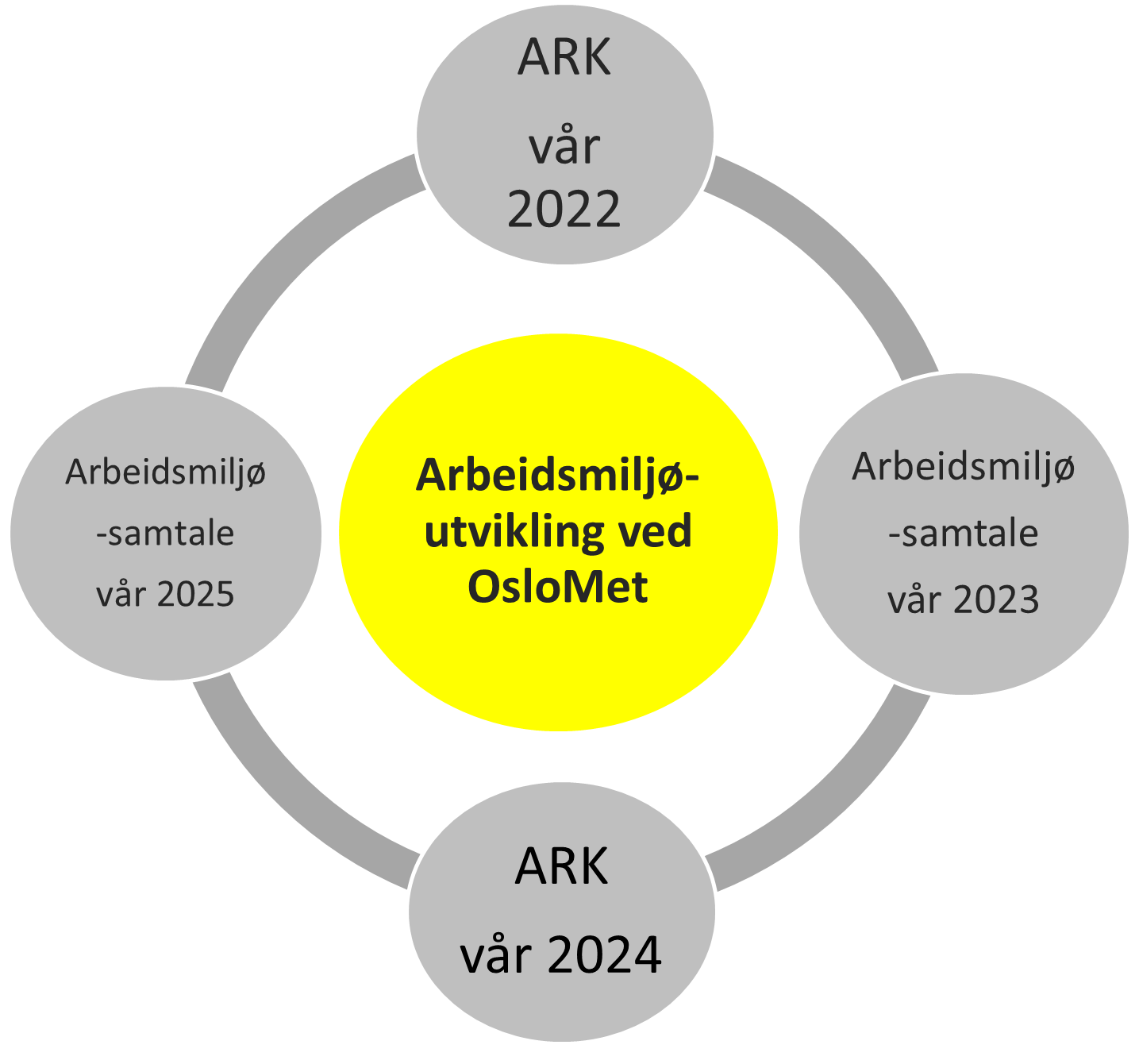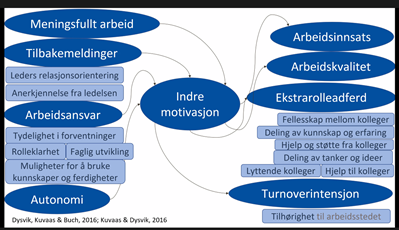The Working Environment Survey “ARK” 2022
-
Why do we need a working environment survey?
The Norwegian Working Environment Act states that the working environment should be healthy and thoroughly sound: «The purpose of the Act is to secure a working environment that provides a basis for a healthy and meaningful working situation...». The employer is obliged to make sure that the Working Environment Act is complied with. The employees have both the right to and duty to contribute. It is in both their interests that the workplace is healthy. Research shows that a high job commitment and high job satisfaction contributes to good health. OsloMet has chosen to use a quantitative employee survey to map and check the status of the working environment – as the employer is obliged to do. The process of the survey, including the follow-up, will secure employee involvement.
The working environment survey is carried out to contribute to the implementation of Strategy 2024: «OsloMet is going to be a professional organisation with committed students and staff...».The Working Environment Survey “ARK”
- The survey will be carried out and open for you to answer from 21 March to 10 April 2022.
- It focuses on revealing circumstances of common interest relating to our working environment that we can do something about.
- The survey will be sent to all employees working at OsloMet in a 40% position or more, temporary employees, employees on sick leave and employees on leave of absence with pay.
- All employees are encouraged to answer the ARK Survey. The survey will provide us with information at all levels of the organisation, as a basis for preserving what is good and be able to do something about areas that should be better.
Development work
The ARK survey is not only a survey providing us with information on how the current situation is perceived, but also part of an important development work. The results will be used by leaders and employees at all levels of the organisation, together in interaction and dialogue, to further develop our working environment. Take the opportunity to answer the survey, and to actively contribute to the follow-up work in you unit.
The survey is rooted in the management and the working environment committee at OsloMet and will be carried out in cooperation with Stamina Census.
The Norwegian Working Environment Act states that the working environment should be healthy and thoroughly sound: «The purpose of the Act is to secure a working environment that provides a basis for a healthy and meaningful working situation...». The employer is obliged to make sure that the Working Environment Act is complied with. The employees have both the right to and duty to contribute. It is in both their interests that the workplace is healthy. Research shows that a high job commitment and high job satisfaction contributes to good health. OsloMet has chosen to use a quantitative employee survey to map and check the status of the working environment – as the employer is obliged to do. The process of the survey, including the follow-up, will secure employee involvement.
The working environment survey is carried out to contribute to the implementation of Strategy 2024: «OsloMet is going to be a professional organisation with committed students and staff...», -
The topic of the survey
The topic of the survey is factors that research shows will develop a good working environment, coping climate, and internal and external motivation. Such factors may for instance include meaningful work, responsibility, feedback, autonomy. Internal motivation may affect factors such as work effort, quality, turnover intention and organisational affiliation.
A working environment characterised by motivated and committed employees is a condition for us succeeding in reaching our overall goals.- Read more about the ARK survey on NTNU’s website.
- More about using ARK-data in research (ntnu.no)
Job demands resource model
The working environment survey ARK is based on the job demands resource model. The questionnaire is research-based and scientifically documented. The picture below shows how important job demands in the working environment (e.g., meaningful work, help and support from colleagues, feedback and autonomy) are connected with inner motivation, and requirements such as work effort and quality
ARK film about the job demands resource model (youtube.com, 5 min)
-
ARK is based on research
-
Involvement and contribution
The line management is responsible for the results and the follow-up work, including action plans. The safety representatives shall participate in the planning and be consulted. HR-advisers may be of assistance when you are working with the mapping/the feedback and the measures, if necessary.
The ARK survey is rooted in the working environment committee and the information, consultation and negotiation committee at OsloMet. The committees will be informed during the process.
Reference group for the ARK-project at OsloMet:
- Anne K. Blickra, Head of section for HR, Faculty of Health Sciences
- Målfrid Hoaas, Faculty director, Faculty of Technology, Art and Design
- Gry Merethe Lutro, Head of Section for HR, Faculty of Education and international Studies
- Marthe Eikum-Tang, Senior safety representative
- Ida Tolgensbakk, Chief safety representative, Centre for Welfare and Labour Research
- Erik Dahlgren, Chief employee representative, The Norwegian Association of Researchers
- May-Lill Skogli, Senior adviser, Centre for Welfare and Labour Research
- Margrethe Waage, Programme coordinator for the OsloMet Academy, Department of HR
Project manager: Karin L. Bakke, Department of HR, Division for Digitalisation and Cooperative Governance
Operative resources (quality assurance, data extraction):
- Cecilie Haugen Horn, Head of section, the university administration and Centre for Welfare and Labour Research
- Mette Sandberg, Senior adviser, Faculty of Social Sciences
- Benedicte Angell, Senior adviser, Faculty of Technology, Art and Design
- Ingrid A. Tsolakis, Senior adviser, Cecilie Rønning Voster, Advisor, both from the Faculty of Education and International Studies
- May-Lill Skogli, Senior adviser, Centre for Welfare and Labour Research
-
Anonymity and protection of privacy
The anonymity of the employees is guaranteed by our enterprise (OsloMet) and our cooperation partner the ARK-secretariat at the Norwegian University of Science and Technology (NTNU) who collects data and prepares reports afterwards. The agreement with ARK entails the following:
- Analyses involving background variables are only processed at the enterprise level. Thus, they are only processed for the entire organisation as a whole and are not broken down to the levels of the individual units.
- One week after the deadline for answering the survey, there will no longer be a connection between the persons e-mail address and the answer to the survey.
- Reports will only be prepared if five or more answers are available per unit.
- Leaders will receive information about the response rate in their unit, but are not given access to individual answers, their background variables or who has answered the survey or not.
- There will be no analyses of raw data while the survey is open for answering. During this period, only information on response rates will be retrieved.
NTNU is responsible for conducting the survey and storing data. On behalf of NTNU, the Norwegian Center for Research Data (NSD) has assessed the processing of personal data in this project and decided that it is in accordance with the Personal Data Act / GDPR.
-
Feedback and follow-up
As soon as the results are available, the Rector's management team will be presented with the results for OsloMet as a whole. A presentation will also be given to the working environment committee and the information, consultation and negotiation committee. The results of the survey will be used both in the university administration, at the faculty and at the centres. Each leader gets access to his/her own results, which means that, e.g., a dean receives reports for his/her own management group, his/her own faculty and all units underlying this faculty. The senior manager is responsible for following up his/her leaders so that all leaders with personnel responsibilities conduct feedback meetings and follow up the results through action plans for their own unit / department / section.
In some cases, perhaps one would like to discuss other conditions related to the working environment than those captured by the employee survey. The feedback meetings should also allow discussions of other matters of importance for the working environment that are of common interest.
When the results are available, mandatory training will be given to all leaders with personnel responsibilities. The aim of the training is to provide the leaders with knowledge about how to read the reports, as well as how to lead good feedback- and action meetings, including action plans.
-
Ownership and common understanding
The purpose of the feedback meeting is to establish ownership and common understanding of the results in your own unit, in addition to talking about how the leader and the employees together can contribute to the development of the working environment. Through this dialogue, you are going to identify specific measures for follow-up of areas in the working environment worth preserving and areas that need improvement.
All employees are responsible for participating and actively contributing to the preparation of measures for the development of the working environment.
Process supervisors from HR can assist the leaders in the preparation, implementation and follow-up of the feedback meetings.
-
Educational films
-
What is ARK? (film.oslomet.no, 6:27 min) - in Norwegian only
-
The job demands resource model (youtube.com, 5 min) - in Norwegian only
-
The different phases of follow-up relating to the working environment survey (film.oslomet.no, 3:28 min) - in Norwegian only
-
-
Systematic working environment development over time
An engaging and motivating working environment does not come by itself - we create it together through dialogue, good management and good employee contribution.
As the figure below shows, plans are made for the employee survey and the working environment consultation (former HSE interviews, https://ansatt.oslomet.no/arbeidsmiljosamtale) to be conducted every other year. There will thus be a connection between these two that ensures that the employee survey is followed up.

The working environment consultation will include capturing the factors that promote and inhibit job engagement, how we have followed up the previous employee survey, what remains and should be continued this year, and any new / other topics that are important to us in relation to creating a good working environment.
-
FAQ

